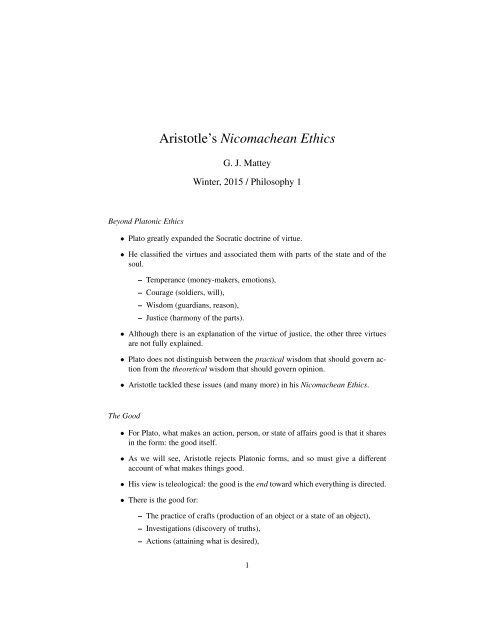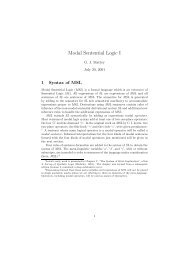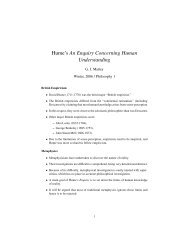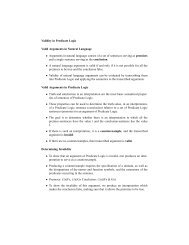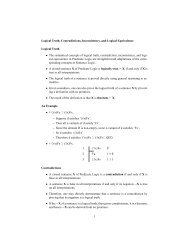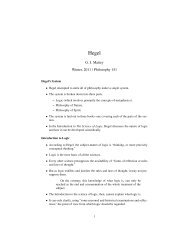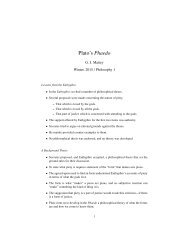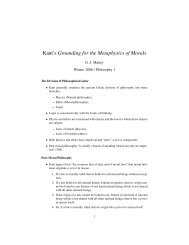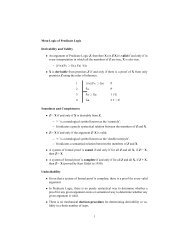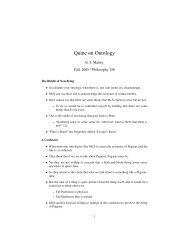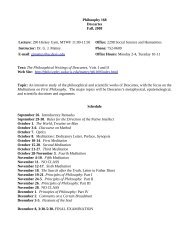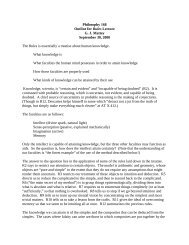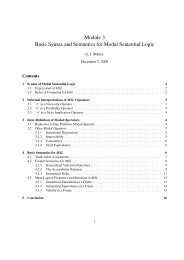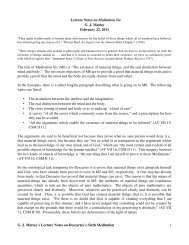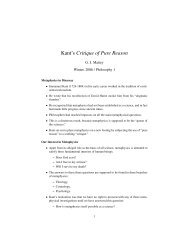Aristotle's Nicomachean Ethics - the UC Davis Philosophy Department
Aristotle's Nicomachean Ethics - the UC Davis Philosophy Department
Aristotle's Nicomachean Ethics - the UC Davis Philosophy Department
You also want an ePaper? Increase the reach of your titles
YUMPU automatically turns print PDFs into web optimized ePapers that Google loves.
Aristotle’s <strong>Nicomachean</strong> <strong>Ethics</strong><br />
G. J. Mattey<br />
Winter, 2015 / <strong>Philosophy</strong> 1<br />
Beyond Platonic <strong>Ethics</strong><br />
• Plato greatly expanded <strong>the</strong> Socratic doctrine of virtue.<br />
• He classified <strong>the</strong> virtues and associated <strong>the</strong>m with parts of <strong>the</strong> state and of <strong>the</strong><br />
soul.<br />
– Temperance (money-makers, emotions),<br />
– Courage (soldiers, will),<br />
– Wisdom (guardians, reason),<br />
– Justice (harmony of <strong>the</strong> parts).<br />
• Although <strong>the</strong>re is an explanation of <strong>the</strong> virtue of justice, <strong>the</strong> o<strong>the</strong>r three virtues<br />
are not fully explained.<br />
• Plato does not distinguish between <strong>the</strong> practical wisdom that should govern action<br />
from <strong>the</strong> <strong>the</strong>oretical wisdom that should govern opinion.<br />
• Aristotle tackled <strong>the</strong>se issues (and many more) in his <strong>Nicomachean</strong> <strong>Ethics</strong>.<br />
The Good<br />
• For Plato, what makes an action, person, or state of affairs good is that it shares<br />
in <strong>the</strong> form: <strong>the</strong> good itself.<br />
• As we will see, Aristotle rejects Platonic forms, and so must give a different<br />
account of what makes things good.<br />
• His view is teleological: <strong>the</strong> good is <strong>the</strong> end toward which everything is directed.<br />
• There is <strong>the</strong> good for:<br />
– The practice of crafts (production of an object or a state of an object),<br />
– Investigations (discovery of truths),<br />
– Actions (attaining what is desired),<br />
1
– Decisions (performing actions which will attain what is desired).<br />
• Generally, <strong>the</strong> products of our activities are better than <strong>the</strong> activities <strong>the</strong>mselves.<br />
• Aristotle wonders whe<strong>the</strong>r <strong>the</strong>re is an end-product which is best of all.<br />
The Highest Good<br />
• Aristotle gives a reason to think that <strong>the</strong>re is a highest good.<br />
• Some activities have ends which <strong>the</strong>mselves are directed toward o<strong>the</strong>r ends.<br />
– Making equipment for horses serves <strong>the</strong> end of horsemanship.<br />
– Horsemanship serves <strong>the</strong> end of generalship.<br />
• The higher-level ends are more choiceworthy than are <strong>the</strong> lower, since <strong>the</strong> lower<br />
ends are pursued for <strong>the</strong> sake of <strong>the</strong> higher ends.<br />
• It would be futile to pursue ends that do not terminate in a highest end, so it<br />
seems that <strong>the</strong>re should be a highest good for each specific activity.<br />
• If <strong>the</strong>re is an end toward which all activity whatsoever is directed, this would be<br />
<strong>the</strong> highest, or most choiceworthy, good.<br />
Communitarianism<br />
• Knowledge of <strong>the</strong> highest good would be extremely helpful in determining <strong>the</strong><br />
best way to live.<br />
• So it is useful to look for a science whose subject is <strong>the</strong> highest good.<br />
• The best way to live might be determined by what is best for:<br />
– The individual,<br />
– The community.<br />
• Aristotle is a “communitarian,” in that he claims that <strong>the</strong> good for <strong>the</strong> community<br />
is higher than that for <strong>the</strong> individual.<br />
– The good for <strong>the</strong> community is “finer and more divine” than that for <strong>the</strong><br />
individual.<br />
• The science of what is good for <strong>the</strong> community is political science.<br />
• So <strong>the</strong> study of individual good, ethics, is useful insofar as it serves political<br />
science.<br />
2
Happiness<br />
• So what is <strong>the</strong> highest good achievable in actions?<br />
• Everyone, educated or not, agrees that <strong>the</strong> highest good is “happiness” (eudaimonia).<br />
• It is also agreed that being happy is <strong>the</strong> same as “living well and doing well.”<br />
• But <strong>the</strong> agreement is only about <strong>the</strong> name: <strong>the</strong>re is much disagreement about<br />
what it is to live well and do well.<br />
– “The many” take happiness to be something “obvious and evident”:<br />
∗ Pleasure,<br />
∗ Wealth,<br />
∗ Honor.<br />
– Some among <strong>the</strong> educated (presumably Plato) take it that all of <strong>the</strong>se goods<br />
are caused to be good by something that is good in its own right.<br />
• Those in <strong>the</strong> best position to settle <strong>the</strong> issue are those with <strong>the</strong> best upbringing.<br />
Three Kinds of Life<br />
• Roughly speaking, <strong>the</strong>re are three kinds of life that are thought to be “<strong>the</strong> good<br />
life.”<br />
– Of gratification (favored mainly by <strong>the</strong> many),<br />
– Of political activity (favored by <strong>the</strong> cultivated),<br />
– Of study (favored by <strong>the</strong> scholarly).<br />
• Aristotle rejects <strong>the</strong> first two kinds as characteristic of “<strong>the</strong> good life.”<br />
– The life of gratification is no better than <strong>the</strong> life of a non-human animal,<br />
– The life of political activity aims at ei<strong>the</strong>r:<br />
∗ Honors, which is insecure because it depends on <strong>the</strong> actions of o<strong>the</strong>rs,<br />
∗ Virtue, which is compatible with a life of hardship.<br />
• The life of study is “<strong>the</strong> good life,” but it will be treated later.<br />
3
Critique of Plato’s Theory<br />
• Aristotle finds it uncomfortable to criticize Plato’s <strong>the</strong>ory of <strong>the</strong> good, as Plato<br />
was his friend, but he must do so in <strong>the</strong> interests of truth.<br />
• There is no common idea of good which covers both ways we understand it:<br />
– As substance, “<strong>the</strong> good,”<br />
– As quality, “is good,”<br />
– As relative, “is useful for.”<br />
• If <strong>the</strong>re were a single thing that makes all things good, <strong>the</strong>re would be a single<br />
science of what is good.<br />
• But <strong>the</strong>re are many sciences of subordinate goods.<br />
– Medicine studies <strong>the</strong> means to health, which is a good.<br />
• It seems pointless to seek a science of what is “good in its own right,” since<br />
knowledge of this plays no role in <strong>the</strong> sciences of <strong>the</strong> subordinate goods.<br />
The End is Happiness<br />
• The good of any activity is that for <strong>the</strong> sake of which something is undertaken:<br />
– Health, in medicine,<br />
– Victory, in generalship.<br />
• Unlike any subordinate goods, a highest good is one that is complete.<br />
• If only one good is complete, <strong>the</strong>n this is <strong>the</strong> highest good.<br />
• Only an end pursued in its own right is complete.<br />
• Happiness is <strong>the</strong> only human good pursued in its own right.<br />
• So only happiness is complete, and <strong>the</strong>refore only happiness is <strong>the</strong> highest good<br />
for human beings.<br />
• Honor, pleasure, understanding are all chosen for <strong>the</strong> sake of happiness.<br />
4
Human Function and Human Good<br />
• To understand happiness better, we need to understand what <strong>the</strong> good is for humans<br />
as humans.<br />
• The distinctively human function is for <strong>the</strong> soul to act in ways that involve reason.<br />
– Obeying reasons,<br />
– Reasoning.<br />
• The function of an excellent person is to use reason “well and finely.”<br />
• A function is carried out excellently according to <strong>the</strong> virtue of that function.<br />
• So, <strong>the</strong> good of human beings is <strong>the</strong> rational activity of <strong>the</strong> soul in accord with<br />
<strong>the</strong> best and most complete virtue.<br />
• Moreover, this activity must be carried out over a considerable period of time.<br />
Happiness<br />
• There are many accounts of what happiness is:<br />
– Virtue,<br />
– Prudence,<br />
– Wisdom,<br />
– One or more of <strong>the</strong> above, with <strong>the</strong> addition of pleasure,<br />
– Any of <strong>the</strong> above, with <strong>the</strong> addition of external prosperity.<br />
• Living virtuously, prudently, and wisely brings pleasure with it, so it need not be<br />
added.<br />
• Happiness is <strong>the</strong>:<br />
– Best,<br />
– Finest,<br />
– Most pleasurable.<br />
• But it also requires external goods, since:<br />
– Fine actions require resources,<br />
– Deficiencies lead to unhappiness.<br />
5
The Source of Happiness<br />
• There are several views about <strong>the</strong> source of happiness:<br />
– Some form of cultivation:<br />
∗ Learning,<br />
∗ Habituation.<br />
– Divine fate,<br />
– Luck.<br />
• Cultivation is <strong>the</strong> best means to happiness.<br />
• It allows happiness to be accessible to anyone (with means).<br />
• It conforms to <strong>the</strong> claim that political science is <strong>the</strong> science of human good, since<br />
<strong>the</strong> state is in a position to promote <strong>the</strong> cultivation of virtue.<br />
The Ups and Downs of Life<br />
• A person’s happiness is to be measured by <strong>the</strong> course of his lifetime.<br />
• It applies to <strong>the</strong> person while alive, not when dead.<br />
• Minor ups and downs of fortune do not affect a person’s overall happiness.<br />
– The main factor is virtue, which is stable.<br />
• A person can lose a good deal of happiness due to external misfortune.<br />
– But even <strong>the</strong>n, when one has virtue, he will never be miserable.<br />
• The most blessed person is one who has, and will keep, <strong>the</strong> goods required for<br />
maximal happiness.<br />
The Virtues<br />
• The political scientist must study <strong>the</strong> soul in order to understand virtue.<br />
• The soul is divided into two parts:<br />
– The non-rational,<br />
– The rational.<br />
• The virtues of <strong>the</strong> non-rational part of <strong>the</strong> soul are not distinctively human.<br />
• The rational soul functions in two ways:<br />
6
– It listens to and obeys reason (as with parental advice),<br />
– It reasons actively (as with ma<strong>the</strong>matical proof).<br />
• Correspondingly, <strong>the</strong>re are two kinds of virtue:<br />
– Virtues of character (generosity, temperance),<br />
– Virtues of thought (wisdom, comprehension, prudence).<br />
Virtues of Character<br />
• Virtues of character are <strong>the</strong> “ethical” virtues.<br />
• They are <strong>the</strong> product of habit, while virtue of thought arises from teaching.<br />
• They do not arise in us naturally, but require repetitive training of <strong>the</strong> kind one<br />
gets in learning a craft.<br />
• It is all-important to develop <strong>the</strong>se habits from youth.<br />
• Excess in ei<strong>the</strong>r direction is detrimental to <strong>the</strong> development of virtue.<br />
– Someone who never stands firm becomes cowardly,<br />
– Someone who fears nothing becomes rash.<br />
• One develops <strong>the</strong> habit of standing firm by actually doing so, and <strong>the</strong> more accustomed<br />
he is to doing this, <strong>the</strong> more he will do so in <strong>the</strong> future.<br />
Pleasure and Pain<br />
• Pleasure and pain can be a help or a hindrance to virtue.<br />
– One finds it painful to abstain from excessive drinking.<br />
• Correct education will enable us to feel pleasure and pain appropriately for action.<br />
– The temperate person will feel pleasure in abstinence.<br />
• Because of <strong>the</strong> bad effect of pleasure and pain on human behavior, some have<br />
held that virtue is not being affected by <strong>the</strong>m.<br />
• But <strong>the</strong> correct response is that <strong>the</strong> virtuous person is affected by pleasure and<br />
pain in <strong>the</strong> right way.<br />
• “Virtue is about pleasures and pains.”<br />
7
Character and Action<br />
• Virtuous actions are to be understood in terms of what a virtuous person would<br />
do.<br />
• A just action, for example, is an action that would be carried out by a just person.<br />
• But virtuous character is <strong>the</strong> result of <strong>the</strong> performance of virtuous actions.<br />
• These actions put <strong>the</strong> person into <strong>the</strong> right state to perform o<strong>the</strong>r virtuous actions.<br />
• There are three conditions necessary for virtuous action:<br />
– Knowing that <strong>the</strong> action is virtuous,<br />
– Deciding to do <strong>the</strong> action because it is virtuous,<br />
– Making <strong>the</strong> decision on <strong>the</strong> basis of “a firm and unchanging state.”<br />
The Mean<br />
• Virtue is a state of a person, but what kind of state?<br />
• In nature, craft, and science, a good product is one that is not excessive in any<br />
way.<br />
• Because it is superior to <strong>the</strong>se things, a virtuous state is one that produces moderate<br />
results.<br />
• “It is a mean between two vices, one of excess and one of deficiency.”<br />
• In one sense, though, virtue is an extreme—an extreme of goodness of one’s<br />
state and one’s results.<br />
The Individual Virtues<br />
• Courage is <strong>the</strong> mean between feelings of fear and of confidence.<br />
• Temperance is <strong>the</strong> mean between pains and pleasures.<br />
• There are two virtues which are means between wastefulness and stinginess:<br />
– Generosity, where small matters are concerned (giving to charity),<br />
– Magnificence, where large matters are concerned (endowing an institute to<br />
study disease).<br />
• O<strong>the</strong>r virtues of character are described as means between extremes.<br />
• It remains to describe virtues of thought and justice as a virtue.<br />
8
Virtue and Practical Reason<br />
• Now that <strong>the</strong> virtues of character have been explained, we may turn to <strong>the</strong>ir role<br />
in human action.<br />
• The link is through decisions to act.<br />
• Decisions are <strong>the</strong> outcome of rational deliberation.<br />
• Rational deliberation is practical reasoning.<br />
– We deliberate about <strong>the</strong> practical means whereby we can bring about our<br />
ends.<br />
• The ends for which we act are what we think to be good for us.<br />
• Virtues of character allow a person to recognize what really is good.<br />
• The good is <strong>the</strong>n adopted as <strong>the</strong> end whose means are <strong>the</strong> subjects of rational<br />
deliberation.<br />
Can Virtuous Acts Be Praised?<br />
• An action is voluntary to <strong>the</strong> extent that nei<strong>the</strong>r it nor its end is forced upon <strong>the</strong><br />
agent.<br />
• We praise or blame a person for acting only if <strong>the</strong> action is voluntary.<br />
• If <strong>the</strong> person has chosen <strong>the</strong> means by rational deliberation, <strong>the</strong>n to that extent<br />
<strong>the</strong> action is voluntary.<br />
• If <strong>the</strong> end is determined by one’s virtuous character, it might seem to be involuntary.<br />
• But <strong>the</strong> virtuous character of <strong>the</strong> agent is acquired willingly, through cultivation<br />
of habit.<br />
• So, deliberative action from a virtuous character is voluntary, and virtuous acts<br />
can be praised.<br />
Justice<br />
• If justice is a virtue of character, it is a state of a soul which aims at <strong>the</strong> mean<br />
between extremes.<br />
• Just people are lawful and fair, so acting lawfully and fairly should promote some<br />
mean.<br />
9
• The extremes are:<br />
– What is good, without regard to <strong>the</strong> individual,<br />
– What is bad without regard to <strong>the</strong> individual.<br />
• Acting lawfully and fairly promotes <strong>the</strong> mean, which is what is good for <strong>the</strong><br />
agent.<br />
– Wealth is unconditionally good, but it is not good for me if I gain it by <strong>the</strong>ft.<br />
• Correctly established law will promote o<strong>the</strong>r virtues, so justice is <strong>the</strong> supreme<br />
virtue.<br />
• Justice is also complete because, unlike <strong>the</strong> o<strong>the</strong>r virtues, it is directed toward<br />
o<strong>the</strong>r people.<br />
Virtues of Thought<br />
• Having completed his discussion of <strong>the</strong> virtues of character, Aristotle turns to <strong>the</strong><br />
virtues of thought.<br />
• There are two virtues of thought:<br />
– Prudence (rationally acquired true beliefs concerning contingent facts about<br />
what is good for us),<br />
– Wisdom (<strong>the</strong>oretical knowledge of necessary truths).<br />
• It may seem that prudence and wisdom are of no use to one who is already clever.<br />
• But <strong>the</strong> two virtues are productive:<br />
– Prudence elevates <strong>the</strong> natural virtue of cleverness to “full virtue,” by directing<br />
it to <strong>the</strong> good.<br />
– Wisdom produces happiness.<br />
• Socrates was correct in saying that all virtues require prudence, but wrong in<br />
saying <strong>the</strong>y are all instances of prudence.<br />
A Life of Study or a Life of Action?<br />
• A life of study is superior to a life of action.<br />
• The reason for <strong>the</strong> superiority of study is that study is an end in itself, while<br />
action is aimed at a fur<strong>the</strong>r end.<br />
• Study is also <strong>the</strong> most characteristically human function, one not shared with<br />
animals.<br />
10
• On <strong>the</strong> o<strong>the</strong>r hand, it is shared with <strong>the</strong> divine beings, whose activity consists<br />
entirely of contemplation.<br />
• Since <strong>the</strong> life of <strong>the</strong> scholar is both <strong>the</strong> most human and partakes of <strong>the</strong> divine, it<br />
is <strong>the</strong> happiest life.<br />
• Persons of action can attain a secondary degree of happiness if <strong>the</strong>y possess <strong>the</strong><br />
virtues of character.<br />
• Because of <strong>the</strong> superiority of study to action, wisdom would be a virtue superior<br />
to prudence.<br />
Virtue and Political Science<br />
• A good society will enact laws which promote <strong>the</strong> development of virtue in individuals.<br />
• As noted above, virtue is developed by habituation, and <strong>the</strong> process begins in <strong>the</strong><br />
home.<br />
• The laws should promote <strong>the</strong> continuation of <strong>the</strong> process of habituation after <strong>the</strong><br />
individual leaves <strong>the</strong> home.<br />
• If <strong>the</strong> laws are to be effective, <strong>the</strong>y must be based on political science.<br />
• The Sophists teach only how to be successful politically, and so <strong>the</strong>ir teaching<br />
does not promote good legislation.<br />
• Political science will examine two things:<br />
– Existing political <strong>the</strong>ory,<br />
– The successes and failures of past and present political institutions.<br />
11


